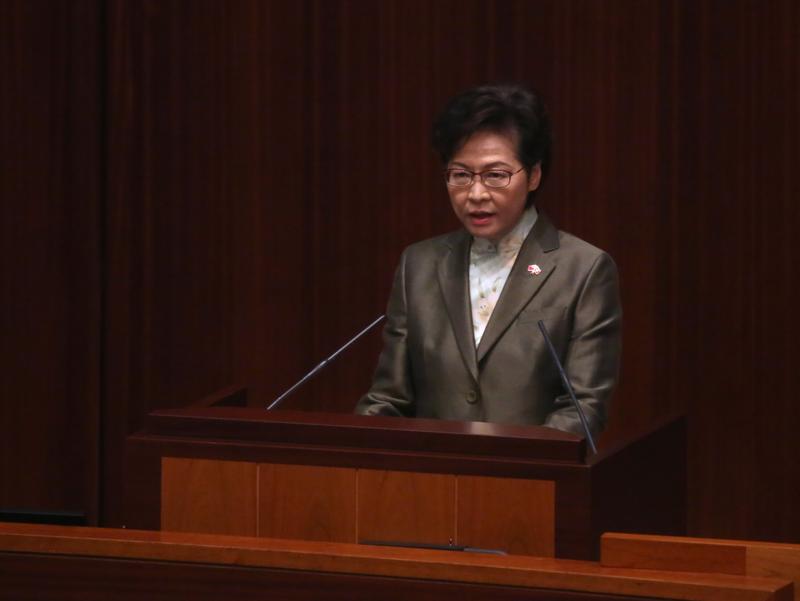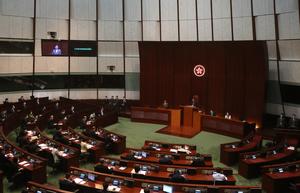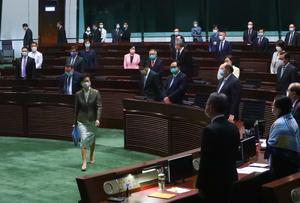 Hong Kong's Chief Executive Carrie Lam Cheng Yuet-ngor delivers her fourth Policy Address at the Legislative Council, Hong Kong, Nov 25, 2020. (PARKER ZHENG/CHINA DAILY)
Hong Kong's Chief Executive Carrie Lam Cheng Yuet-ngor delivers her fourth Policy Address at the Legislative Council, Hong Kong, Nov 25, 2020. (PARKER ZHENG/CHINA DAILY)
HONG KONG - Hong Kong's Chief Executive Carrie Lam Cheng Yuet-ngor pledged to uphold "one country, two systems" and stressed her government's resolve to achieve "zero infection" while reviving the city's battered economy in her widely awaited fourth Policy Address delivered Wednesday.
In opening her address at Hong Kong's Legislative Council, Lam stressed the SAR's economic integration with the Chinese mainland as the focal point of her blueprint. She cited the central government's strong policy support in maintaining lasting prosperity and stability in Hong Kong.
READ MORE: Central govt's HK assistance to be unveiled
Carrie Lam said it was her government's urgent priority to restore constitutional order in Hong Kong and pull its political system out of "chaos"
Lam cited Chapter 4 of the Basic Law to emphasize her laid out role and that there is no conflict between a committed executive and an independent judiciary. She said external forces had so grossly interfered with Hong Kong affairs that the central government had to step in to guarantee Hong Kong residents' rights and freedoms in accordance with the Basic Law.
Lam said the Law of the People's Republic of China on Safeguarding National Security in the Hong Kong Special Administrative Region and the Standing Committee of the National People's Congress's (NPCSC) decision on the qualification of LegCo members had absolute legal basis and the CE repeatedly stressed the rule of law in Hong Kong.
Lam said it was her government's urgent priority to restore constitutional order in Hong Kong and pull its political system out of "chaos". She said a bill will be introduced soon to enhance oath-taking measures.
In a reference to nearly 2,000 primary and secondary students arrested in the extradition bill incident, Lam said police will consider handling the cases of minors, who were arrested during social unrest that erupted in June 2019, with measures conducive to their rehabilitation as appropriate, if the arrestees have expressed contrition and are not involved in serious offences.
Striving for 'zero infection'
Lam said her government may consider implementing a large-scale universal community testing for COVID-19 arrangement again in a bid to achieve the target of "zero infection"
Lam said her government may consider implementing a large-scale universal community testing for COVID-19 arrangement again in a bid to achieve the target of "zero infection". "The year 2020 has presented mankind with an unprecedented public health crisis," Lam said, urging people not to lower their guards. She said the central government supported the gradual resumption of travel between Hong Kong and Guangdong without the need for compulsory quarantine in an orderly manner through mutual recognition of health codes.
Economy
Lam said she expected the SAR's economy to contract by 6.1 percent in 2020 and pledged support for entrepreneurs to explore more market opportunities beyond Hong Kong. She cited the central government's 12th and 14th five-year plans to point out central officials' vision for Hong Kong and said the SAR had a lot to benefit from the "dual circulation" model that placed a huge premium on the national domestic market.
ALSO READ: SARs set to play bigger role in dual circulation model
She said her government will work to integrate proactively into national development, "striving to resolve the two major bottlenecks of land and talents, and investing substantially in I&T industries". She said Hong Kong could become a “participant” in domestic circulation and a “facilitator” in international circulation.
 Hong Kong's Chief Executive Carrie Lam Cheng Yuet-ngor delivers her fourth Policy Address at the Legislative Council, Hong Kong, Nov 25, 2020. (PARKER ZHENG/CHINA DAILY)
Hong Kong's Chief Executive Carrie Lam Cheng Yuet-ngor delivers her fourth Policy Address at the Legislative Council, Hong Kong, Nov 25, 2020. (PARKER ZHENG/CHINA DAILY)
Lam said from end-2019 to end-September this year, the total deposits of banks grew by 7.3 percent while pointing out how Hong Kong had preserved its status as a global financial hub.
Lam said the Stock Connect trading schemes connecting mainland and Hong Kong bourses, will be enhanced by accelerating the introduction of new rules allowing loss-making mainland biotechnology firms to list in Hong Kong, and for stocks to be listed on the mainland’s sci-tech innovation board.
The government also planned to launch the Greater Bay Area Youth Employment Scheme to encourage enterprises with operations in both Hong Kong and the Bay Area to recruit and deploy local university graduates to work in the mainland cities. The scheme will provide some 2,000 places, Lam said.
Lam also pledged to roll out additional relief measures involving a funding of HK$600 million for the tourism industry, make use of the HK$1 billion Convention and Exhibition Industry Subsidy Scheme to subsidize exhibitors, and spend more than HK$100 billion annually in the next few years, creating over 300,000 jobs in the construction sector.
Housing
Acknowledging that the core of the housing problem in Hong Kong lies in the shortage of land for housing development, Lam said 330 hectares of land required for providing 316,000 public housing units to meet the demand for about 301,000 public housing units in the coming 10 years had been identified and expected 260 starter home units for sale in 2024. She said the redevelopment of Tai Hang Sai Estate can provide more than 3,300 units. The government plans a trial scheme to provide cash allowance for grassroots families waiting for public housing for a long time. It will start receiving applications in mid-2021 and disbursing cash allowance from July onwards, Lam said.
READ MORE: HK housing supply plunges due to slowdown in construction
Lam said the double stamp duty will be removed for non-residential property while making it clear that there was no plan to adjust stamp duty on residential property
Her government will implement a pilot scheme to subsidize NGOs to rent suitable rooms in hotels and guesthouses with relatively low occupancy rates for use as transitional housing.
A second topside public housing project on railway facilities since the Kornhill development on the Island Line four decades ago in the 1980s is being planned at the MTR's Siu Ho Wan depot site.
Lam said the double stamp duty will be removed for non-residential property while making it clear that there was no plan to adjust stamp duty on residential property.
Welfare
Lam said recurrent government expenditures on social welfare and healthcare have increased from HK$65.3 billion and HK$62.6 billion in 2017-18 to HK$93.9 billion and HK$87.1 billion in 2020-21 respectively, with an average annual increase of 12.9 percent and 11.6 percent. In the past 12 months up to late October, the total number of Comprehensive Social Security Assistance (CSSA) unemployment cases recorded a nearly 55 percent increase. As such, new arrangement under which the total cash value of insurance policies of able-bodied CSSA applicants/recipients will be disregarded as assets for a period of one year.
The Public Transport Fare Subsidy Scheme has been extended by another six months, guaranteeing subsidy amounting to one-third of the monthly public transport expenses in excess of HK$200, capped at HK$400 per month and benefiting around 3.8 million people. Also, the MTR will continue to extend the 20 percent fare discount until March 2021. Short-term Food Assistance Service Projects (STFASPs) will be made a permanent service with an outlay of HK$415 million and the Elderly Dental Assistance Programme will be widened. On the mental health front, the government will set aside HK$300 million.
The government plans to raise the number of On-site Pre-school Rehabilitation Services to 10,000 in the 2022/23 school year with the aim of achieving zero-waiting time.
Also, in an effort to promote e-learning, Lam's government will set aside HK$2 billion in the Quality Education Fund to launch a three-year program.
 Hong Kong's Chief Executive Carrie Lam Cheng Yuet-ngor arrives at the Legislative Council Chamber to deliver her fourth Policy Address, Hong Kong, Nov 25, 2020. (CALVIN NG/CHINA DAILY)
Hong Kong's Chief Executive Carrie Lam Cheng Yuet-ngor arrives at the Legislative Council Chamber to deliver her fourth Policy Address, Hong Kong, Nov 25, 2020. (CALVIN NG/CHINA DAILY)
Aviation hub
Lam said the Civil Aviation Administration of China has agreed to allow cross-boundary commercial helicopter services between Guangdong and Hong Kong and the central government will allow Airport Authority Hong Kong (AAHK) to inject equity in Zhuhai airport. AAHK will commission the third runway in 2022 and the entire Three-Runway System in 2024 as planned, Lam said.
Lam said the Civil Aviation Administration of China has agreed to allow cross-boundary commercial helicopter services between Guangdong and Hong Kong and the central government will allow Airport Authority Hong Kong to inject equity in Zhuhai airport
She said automated car parks will be developed on the Hong Kong Boundary Crossing Facilities (HKBCF) Island of the Hong Kong-Zhuhai-Macao Bridge, allowing self-driving visitors from Guangdong and Macao using HZMB to fly out from Hong Kong International Airport or visit Hong Kong to park their cars there.
Innovation and technology
The CE said the central government strongly supported the cooperation between Hong Kong and Shenzhen in developing an international I&T hub in the Guangdong-Hong Kong-Macao Greater Bay Area with a view to establishing "one zone, two parks" at "one river, two banks" under the auspices of "one country, two systems". Lam said the central government had greenlighted the joint development of the Shenzhen/Hong Kong Innovation and Technology Co-operation Zone (SITZ), which comprises the Shenzhen Innovation and Technology Zone and the Hong Kong-Shenzhen Innovation and Technology Park (HSITP) at the Lok Ma Chau Loop.
ALSO READ: Innovation push to boost HK’s status as financial hub
The CE also proposed launching a Global STEM Professorship Scheme for a period of five years at an estimated cost of HK$2 billion.
Green living
Lam announced that Hong Kong will strive to be a carbon-neutral city before 2050 and prepare a long-term blueprint on waste management.
Lam announced that Hong Kong will strive to be a carbon-neutral city before 2050 and prepare a long-term blueprint on waste management
Lam said a detailed feasibility study on the Environmentally Friendly Linkage System (EFLS) for Kowloon East had largely been completed that envisages, among other things, introducing new bus and green minibus routes in the area and developing travellators network linking up the former runway of Kai Tak, the Kowloon Bay Action Area and the MTR Ngau Tau Kok Station. Also, in order to promote “Smart Mobility”, the government was working on six pilot projects on automated parking systems.
READ MORE: Net-zero emissions pledge to have global impact
As part of its “Walk in HK” focus with a view to creating a pedestrian-friendly environment, Lam’s government is promoting “walkability” in Kowloon East and will continue to improve existing pedestrian linkage systems in a number of districts.
In her closing remarks at the end of the CE's longest Policy Address, Lam called on the people of Hong Kong to seek common ground while setting aside differences.
"In the coming year, the HKSAR government will double its efforts to put the epidemic under control, revive the economy, restore social order, rebuild Hong Kong’s international reputation and people’s confidence in the government, with a view to relaunching Hong Kong," Lam pledged.
 (GRAPHIC DESIGN BY ALEX TANG / CHINA DAILY)
(GRAPHIC DESIGN BY ALEX TANG / CHINA DAILY)


